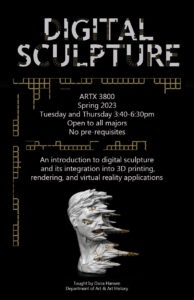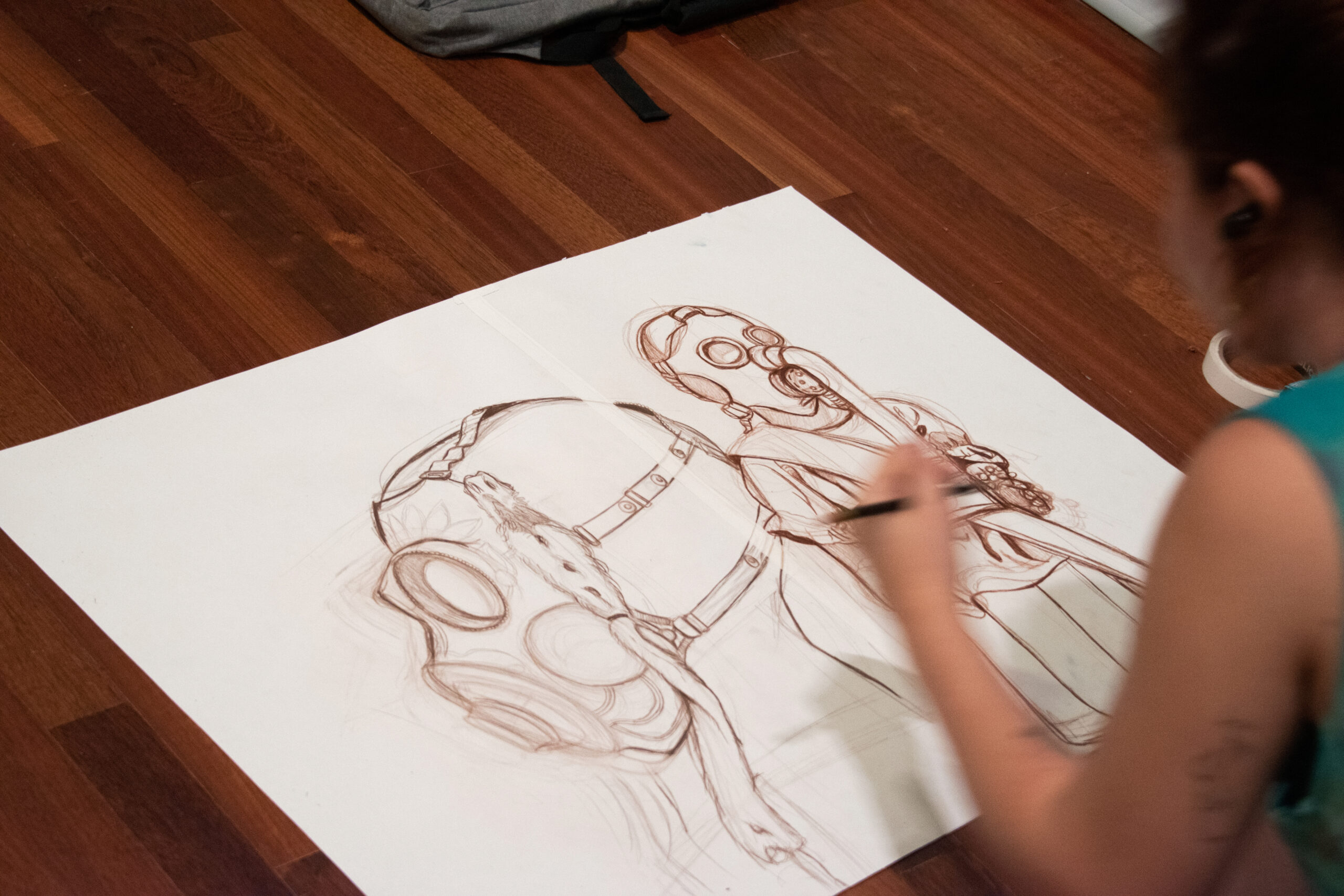
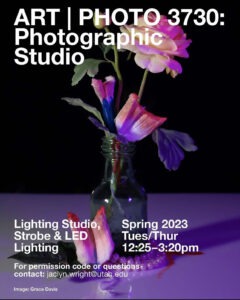 ART/PHOTO 3730: Photographic Studio meets Tues/Thurs 12:25-3:20pm with Professor Jaclyn Wright.
ART/PHOTO 3730: Photographic Studio meets Tues/Thurs 12:25-3:20pm with Professor Jaclyn Wright.
This class is dedicated to studio lighting and medium, as well as large format studio camera operation. The course includes instruction in the use of strobe lighting, quartz hot lights, and reflector and soft box lighting. The course also includes operation of medium format and 4 by 5 sheet film cameras in the studio environment. A variety of subjects are covered, including still life and portraiture. For permission code or questions contact jaclyn.wright@utah.edu.
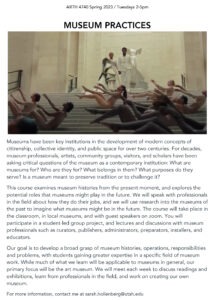 ARTH 4740: Museum Practices meets Tuesdays 2-5pm with Professor Sarah Hollenberg.
ARTH 4740: Museum Practices meets Tuesdays 2-5pm with Professor Sarah Hollenberg.
Museums have been key institutions in the development of modern concepts of citizenship, collective identity, and public space for over two centuries. For decades, museum professionals, artists, community groups, visitors, and scholars have been asking critical questions of the museum as a contemporary institution: What are museums for? Who are they for? What belongs in them? What purposes do they serve? Is a museum meant to preserve tradition or to challenge it?
This course examines museum histories from the present moment, and explores the potential roles that museums might play in the future. We will speak with professionals in the field about how they do their jobs, and we will use research into the museums of the past to imagine what museums might be in the future. The course will take place in the classroom, in local museums, and with guest speakers on zoom. You will participate in a student-led group project, and lectures and discussions with museum professionals such as curators, publishers, administrators, preparators, installers, and educators.
Our goal is to develop a broad grasp of museum histories, operations, responsibilities and problems, with students gaining greater expertise in a specific field of museum work. While much of what we learn will be applicable to museums in general, our primary focus will be the art museum. We will meet each week to discuss readings and exhibitions, learn from professionals in the field, and work on creating our own museum.
For more information, contact sarah.hollenberg@utah.edu.
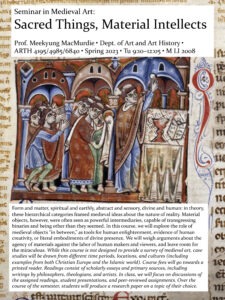 ARTH 4195/4985/6840: Seminar in Medieval Art: Sacred Things, Material Intellects meets Tuesdays 9:10am-12:05pm with Professor Meekyung MacMurdie.
ARTH 4195/4985/6840: Seminar in Medieval Art: Sacred Things, Material Intellects meets Tuesdays 9:10am-12:05pm with Professor Meekyung MacMurdie.
Form and matter, spiritual and earthly, abstract and sensory, divine and human: in theory, these hierarchical categories framed medieval ideas about the nature of reality. Material objects, however, were often seen as powerful intermediaries, capable of transgressing binaries and being other than they seemed. In this course, we will explore the role of medieval objects “in between,” as tools for human enlightenment, evidence of human creativity, or literal embodiments of divine presence. We will weigh arguments about the agency of materials against the labor of human makers and viewers, and leave room for the miraculous. While this course is not designed to provide a survey of medieval art, case studies will be drawn from different time periods, locations, and cultures (including examples from both Christian Europe and the Islamic world). Course fees will go towards a printed reader. Readings consist of scholarly essays and primary sources, including writings by philosophers, theologians, and artists. In class, we will focus on discussions of the assigned readings, student presentations, and peer-reviewed assignments. Over the course of the semester, students will produce a research paper on a topic of their choice.
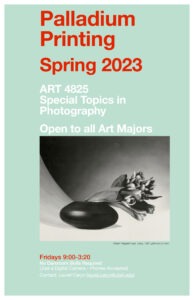 ART 4825: Special Topics in Photography: Palladium Printing meets Fridays 9am-3:20pm with Professor Laurel Caryn.
ART 4825: Special Topics in Photography: Palladium Printing meets Fridays 9am-3:20pm with Professor Laurel Caryn.
This class investigates the photographic process, platinum and palladium printing. This nineteenth century technique is known for its superior detail and unsurpassed tonal range. Students will explore the historical, chemical, and aesthetic aspects of the process. No prior darkroom knowledge required. Open to all Art majors with instructor consent. Course fees cover all materials and paper.
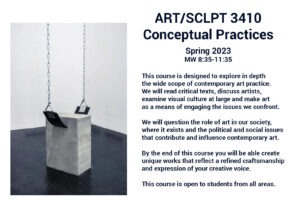 ART/SCLPT 3410: Conceptual Practices meets Mon/Wed 8:35-11:35am with Professor Wendy Wischer.
ART/SCLPT 3410: Conceptual Practices meets Mon/Wed 8:35-11:35am with Professor Wendy Wischer.
This course is designed to explore in depth the wide scope of contemporary art practice. We will read critical texts, discuss artists, examine visual culture at large and make art as a means of engaging the issues we confront.
We will question the role of art in our society, where it exists and the political and social issues that contribute and influence contemporary art.
By the end of this course you will be able to create unique works that reflect a refined craftsmanship and expression of your creative voice.
This course is open to students from all areas.
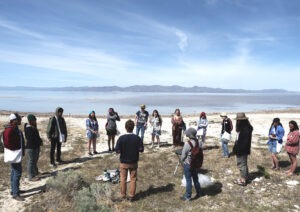 ART 3550: Art in the Community: Art Education beyond School Walls meets Fridays 2-5pm with Professor Joshua Graham.
ART 3550: Art in the Community: Art Education beyond School Walls meets Fridays 2-5pm with Professor Joshua Graham.
This course provides students with an opportunity to explore community-based art education through the theoretical exploration and practical application of ecologically sustainable art that creates community while affecting positive social change. Students explore the aesthetic, historical, political and socio-cultural aspects of community-based art education and work collaboratively with other students and community members to plan and implement a community-based artwork. Students in the course will gain experience planning, facilitating, and evaluating innovative arts programming.
With support from the START (Social Theory in Art Research and Teaching) grant, we will be working together with Stansbury High School, in Tooele County to create community-based art education curriculum and planning and implementing the third annual “Stansbury Island Art Fair.” Students will have the opportunity to add their artwork and curriculum to a growing body of research scheduled for publication in an academic journal and archived on the website hypersaline.org.
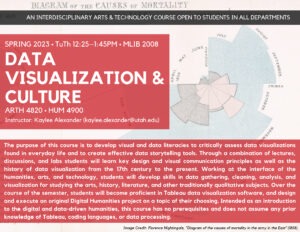 Dr. Kaylee Alexander is 2022-2024 ACLS (American Council of Learned Societies) Post-Doctoral Fellow in the Digital Matters lab in Marriott Library. She holds a Ph.D. in Art History and Visual Culture from Duke University, where she also worked as a research associate with the Duke Art, Law and Markets Initiative. This spring she will be teaching a special topics class open to students of all majors, ARTH 4820: Data Visualization and Culture, meeting Tues/Thurs 12:25-1:45pm. The purpose of this course is to develop visual and data literacies to critically assess data visualizations found in everyday life and to create effective data storytelling tools. Through a combination of lectures, discussions, and labs students will learn key design and visual communication principles as well as the history of data visualization from the 17th century to the present. Working at the interface of the humanities, arts, and technology, students will develop skills in data gathering, cleaning, analysis, and visualization for studying the arts, history, literature, and other traditionally qualitative subjects. Over the course of the semester, students will become proficient in Tableau data visualization software, and design and execute an original Digital Humanities project on a topic of their choosing. Intended as an introduction to the digital and data-driven humanities, this course has no prerequisites and does not assume any prior knowledge of Tableau, coding languages, or data processing.
Dr. Kaylee Alexander is 2022-2024 ACLS (American Council of Learned Societies) Post-Doctoral Fellow in the Digital Matters lab in Marriott Library. She holds a Ph.D. in Art History and Visual Culture from Duke University, where she also worked as a research associate with the Duke Art, Law and Markets Initiative. This spring she will be teaching a special topics class open to students of all majors, ARTH 4820: Data Visualization and Culture, meeting Tues/Thurs 12:25-1:45pm. The purpose of this course is to develop visual and data literacies to critically assess data visualizations found in everyday life and to create effective data storytelling tools. Through a combination of lectures, discussions, and labs students will learn key design and visual communication principles as well as the history of data visualization from the 17th century to the present. Working at the interface of the humanities, arts, and technology, students will develop skills in data gathering, cleaning, analysis, and visualization for studying the arts, history, literature, and other traditionally qualitative subjects. Over the course of the semester, students will become proficient in Tableau data visualization software, and design and execute an original Digital Humanities project on a topic of their choosing. Intended as an introduction to the digital and data-driven humanities, this course has no prerequisites and does not assume any prior knowledge of Tableau, coding languages, or data processing.
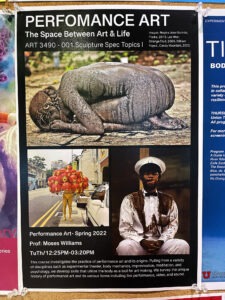 ART/SCLPT 3490 Sculpture Special Topics I: Performance Art meets Tues/Thurs 12:25-3:20pm with Professor Moses Williams.
ART/SCLPT 3490 Sculpture Special Topics I: Performance Art meets Tues/Thurs 12:25-3:20pm with Professor Moses Williams.
This course investigates the practice of performance art and its origins. Pulling from a variety of disciplines such as experimental theater, body mechanics, improvisation, meditation, and psychology, we will develop skills that utilize the body as a tool for art-making. Additionally, we will survey the unique history of performance art and the mediums utilized for its presentation and dissemination, including live performance, video, and still images. Open to majors and minors.
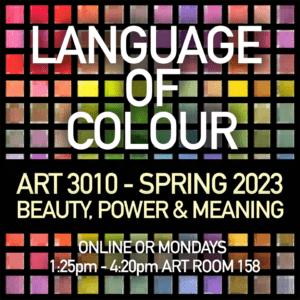 ART 3010 Language of Color meets Mondays 1:25-4:20pm with Professor Elizabeth DeWitte.
ART 3010 Language of Color meets Mondays 1:25-4:20pm with Professor Elizabeth DeWitte.
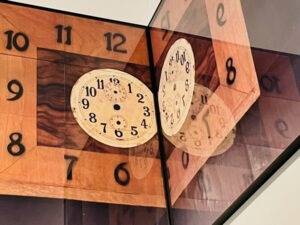 ART 4980 Senior Seminar meets Tuesdays 3:40-6:40pm with Professor Maureen O'Hara Ure.
ART 4980 Senior Seminar meets Tuesdays 3:40-6:40pm with Professor Maureen O'Hara Ure.
Creative Process & other, more basic concerns confronting the artist after college graduation. Readings/Writing Exercises/Guests/Discussions will address diverse concerns, including psychological issues for the artist/order vs chaos, work & discipline outside the structure school provided, studio space, graduate school, artists’ statements, proposal writing, resumes & images, publicity, applications for residencies, internships, commercial galleries & alternative exhibition venues, art hazards, archival issues, employment, finances, taxes, copyright, contracts, etc.
While not limited to those going on to grad school, students from any emphasis thinking about pursuing the MFA would be wise to consider this course. Seminar participants will receive many reports on application process from many recent alums.
